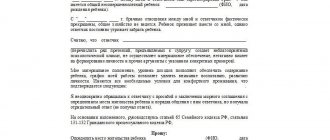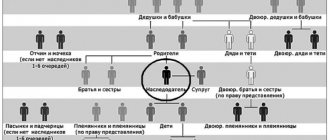After the divorce, few people remain in good and warm relations with their ex-spouse.
Unfortunately, it is women who most often allow negative emotions to influence their (and not only their) subsequent lives - a feeling of resentment and disappointment pushes them to actions that primarily affect children, who are already deprived of the opportunity to communicate daily with their father.
Can an ex-wife prohibit her husband from seeing her child?
Attention
Part 1 Art. 61 of the Family Code of the Russian Federation provides for the principle of equality in the rights and responsibilities of both parents in relation to their children. In this regard, even after a divorce, none of the former spouses can prohibit communication and seeing a minor child.
According to Part 1 of Art. 21 of the RF IC, if divorcing spouses have children together, then the divorce is organized only in court. Divorce through the registry office is prohibited, even if the spouses have no disputes regarding the place of residence and maintenance of the minor. In the interests of the child, the court focuses on the equality of each of the partners, so the child remains with one parent, while the second one sees the baby at the appointed time and takes part in his life.
Thus, according to the general rule established by Part 1 of Art. 66 of the RF IC, a parent (in our case, the ex-wife), with whom the child remains to live after a divorce, does not have the right to interfere with communication and prohibit the second parent from seeing the baby. Part 2 of the same article indicates that the order and mode of communication of the second parent is regulated by agreement between the spouses, or in court. In addition, part 4 of Art. 66 of the RF IC indicates that the second parent can not only see each other, but also receive information about their child through educational institutions, medical organizations, social service departments and other departments.
Why shouldn't a mother prohibit meetings between a child and a father?
For the full development of a child, he needs both parents, even if they do not live together (provided that the man is psychologically stable and does not pose a threat). The child may miss his father, so a long separation has a negative impact on his health: appetite decreases, sleep is disturbed, and whims increase.
It is unethical for a mother to not allow the father to participate in the child’s life, to use him as manipulation and a means of revenge. This is a living person, not property and not an object of bargaining. Therefore, justice is on the father’s side, and he is obliged to protect his rights.
Also, such a restriction of communication violates the following rights of the child:
- the right to know both parents;
- the right to receive care and protection from both parents;
- the right to receive maintenance from both parents.
All these rights are spelled out in the Family Code, therefore they are binding, and there are always legal services to establish the procedure for communicating with a child https://lawyer-78.rf/uslugi/semeynye-dela/poryadok-obshcheniya-s-rebenkom / .
When is a spouse prohibited from seeing a child after a divorce?
The law establishes a general rule according to which the mother does not have the right to prohibit the father from seeing the baby. However, there are exceptions to the general situation when the ex-wife may prohibit seeing the child:
- Communication with dad causes harm to the physical condition of the baby, or creates a threat of causing such harm.
- Contact with the father disrupts the normal psychological state of the minor, destabilizes him and leads to injury.
- As a result of meetings with a man, a child’s moral development suffers, his normal understanding of the world around him and people is disrupted, his attitude towards bad habits changes, and so on.
These exceptions are enshrined in Part 1 of Art. 66 RF IC. In addition to these provisions, it should be noted that a parent deprived of parental rights accordingly loses all rights based on kinship with the minor. This is another reason why the ex-wife can completely legally prohibit the father from seeing and contacting the child, which is enshrined in Art. 71 IC RF.
Art. 74 of the RF IC provides for another reason why a parent may lose the opportunity to see his child, this is a restriction of parental rights. Unlike deprivation, restriction lasts for a certain period - 6 months. Restriction can be applied as a preventive measure, which often precedes deprivation of rights.
IMPORTANT
If we are talking about deprivation of parental rights, then the father does not have the right to communicate and see the minor, but is not relieved of his responsibilities towards him and his ex-wife. Part 2 art. 71 of the RF IC regulates that a father is obliged to support his child and provide him with financial support.
Whose side is the law on if the ex-wife does not allow him to see the child?
It is impossible to answer unequivocally how the dispute will be resolved in a situation where the ex-wife does not allow you to see the child. It all depends on the specific circumstances, the judge analyzes the evidence presented, examines the details and focuses on the interests of the child.
According to Part 2 of Art. 66 of the RF IC, if parents cannot agree on their position and come to an agreement peacefully, the order of meetings with the child is determined in court. Representatives of the guardianship and trusteeship authorities participate in the process; the proceedings are initiated by one of the parents, for example, the father. During the trial, the judge is based on the equality of the parents and the degree of influence each has on the minor.
In accordance with Art. 152 of the Code of Civil Procedure of the Russian Federation, at the request of one of the parents, the judge fixes the procedure for the exercise of parental rights for the period of the proceedings and after it. In addition, the court resolves the issue of the minor’s place of residence and the procedure for the second parent’s communication with him. Based on the results, a determination is made reflecting the features and details of the communication regime for the period before the court decision enters into legal force.
Legal assistance
In complex disputes that arise with your ex-wife, the issue of raising a child may remain unresolved. To more accurately formulate the father’s wishes and actions in accordance with the legislation of the Russian Federation, the child’s father must seek help from a qualified specialist - a lawyer.
The father of the child can turn to a lawyer for both advice and help. During the consultation, the lawyer will explain the procedure for resolving disputes with the ex-wife, list a list of documents for filing a claim in court, provide and explain a number of rights of the father to raise the child.
When providing assistance, the lawyer draws up and collects the necessary documents for the statement of claim, represents interests at the court hearing and monitors the parties' compliance with the court decision.
The cost of a lawyer’s services will depend on the provision of the service, for example:
- Telephone consultations – up to 2000 rubles.
- Consultations by e-mail or sending in a letter - up to 4,000 rubles.
- Preparation of papers – up to 8,000 rubles.
- Representation in court in civil cases – up to 40,000 rubles.
Specific amounts for the provision of legal services will depend on the complexity of the case, the time of application and the conditions under which the child’s father goes to court.
Father's rights to a child after divorce
Attention
Art. 63 of the RF IC indicates that each parent has the right and responsibility to raise their minor children. Mom and dad bear full responsibility for the upbringing, development and personality development of their child. From the moment the baby is born, each parent is obliged to take care of the condition, health, spiritual, physical and mental development of their baby.
In addition, the following rights of the father in relation to the child can be highlighted:
- Priority right to the education and upbringing of your minor child.
- Taking part in choosing an educational institution and form of education, taking into account the interests of the minor.
- Receive information from medical, educational, social and other institutions without the consent of the wife.
- Express consent or refuse to allow the child to travel abroad.
- Express an opinion in the process of choosing a minor's surname.
- Represent the interests of your child in various authorities, including in civil law relations.
- Spend weekends, holidays and vacations once a year with a minor.
These rights are not secured by a single list in a specific article of the RF IC. There are a number of rules providing for certain rights of parents, including Art. 63 of the RF IC, dedicated to the rights to raise and educate children. Art. 67 of the RF IC guarantees the right of a minor to communicate with his relatives. Art. 59 of the RF IC provides for the need to take into account the opinion of the father when changing the child’s surname.
Rules for communication between father and child after divorce
The rules of communication between dad and baby are not clearly regulated by legal norms; they stem from real practice. Communication with a child can be organized in various forms and types without the consent of the wife:
- Meetings on neutral territory.
- Visiting a cafe, circus or amusement park.
- Playing games together, visiting the zoo or otherwise.
- Trips to vacation spots, but if the child crosses the border of the Russian Federation, it is necessary to obtain the consent of the second parent, that is, the wife.
- Conversations on the phone, via video calling, via the Internet.
- Communication using SMS, messages or modern instant messengers.
Parents have the right to choose the most optimal and convenient form for both themselves and the child. Establishing the procedure and rules for communication between a parent with whom the minor does not live can be done with the help of:
- Oral agreement - the husband and wife in the process of divorce did not make a separate claim on the claim, they resolved all the difficulties independently and peacefully.
- Peace agreement, according to Art. 66 of the RF IC, this is a document reflecting the mutual decision of parents on issues of communication, child support and other most significant issues. Concluding an agreement between husband and wife is convenient if the spouses are not confident in the possibility of maintaining a positive relationship. If the need to go to court arises, the agreement will be more important than an oral agreement.
- Judicial resolution of disputes - the judge fixes clear rules and procedures for communication between the father and the child. This is an option in which the parties were unable to agree peacefully, and a need arose for a court decision to resolve conflicts.
The rules of communication in any case should be guided by the interests of the minor. The controlling body is the guardianship and trusteeship office, whose employees supervise the legality of the parties’ actions; you can complain to them if the ex-wife does not allow you to see the child.
Child's property
The child has the right to use individual things. In addition, both parents are required to provide funds for the child’s livelihood.
A child who has not reached the age of majority has the right of ownership to all income and property received by him, without exception. All funds received by the child, for example, alimony, benefits, go to the disposal of the parent with whom the child lives.
The child's powers are protected by the Housing Code, in accordance with which the child has the right to his own share of the living space, even after the dissolution of the marriage between his parents.
My ex-wife won't let me see my child, what should I do?
Quite often, despite court decisions, agreements between the parties and oral agreements, the mother does not allow the father to see the child. A decision is possible only in court, during which the judge will consider and evaluate all the circumstances and make an objective decision. Art. 65 of the RF IC indicates that parents in their relationships should be guided by the rights and interests of the children, therefore, preventing the father from seeing the baby by his wife is, first of all, a violation of the rights of the minor himself.
Attention
The judicial procedure for resolving disputes begins with determining jurisdiction. Issues related to the procedure for communication and the place of residence of the child are considered in the district courts at the place of residence of the mother and baby as the defendant. This rule is enshrined in Art. 23 and Code of Civil Procedure of the Russian Federation.
In the consideration of civil cases related to the interests of children, including if the ex-wife does not allow him to see the child, guardianship and trusteeship authorities must take part. Authorized specialists inspect the living quarters in which children live, examine the mother’s capabilities and the living conditions of the children. Based on the results, an inspection report is issued, in court the specialist expresses his position and evaluates what is happening. This rule is reflected in Art. 78 RF IC.
According to Art. 57 of the RF IC, if a child has reached the age of 10 years, he has the right to express his opinion and express his position regarding the order and rules of communication with his father.
The provisions of administrative legislation provide for the possibility of bringing a mother to justice if she creates obstacles for the father to meet with a minor.
If not divorced
There is an opinion in society that the best educator for a child can only be a mother. Often men themselves refuse such responsibility. But there are also fathers who should not be allowed to see their child at all, since they pose a real threat to the physical or mental health of the child.
Although there are also fathers who would like to always be close to their children, raise them and provide them with everything they need. But their path is blocked by their mother’s taboo on meetings. Therefore, it is important that men know their rights and know how to defend them.
Difficulties in communication between children and parents arise in most cases due to the fault of mothers who do not want to entrust their child to a spouse who has been living separately from the family for some time.
In this way, mothers violate the norms of family law. The justifications for this behavior of women are different. Some people think that the father spends little money on the child, while others want to arrange their personal life and want the child to have a new father. By prohibiting a man from seeing a child, a woman violates not only the rights of her ex-husband, but also the rights of the child.
Drawing up an agreement on the procedure for communicating with a child after a divorce
Art. 55 of the RF IC indicates that a child has every right to maintain communication with both parents and with grandparents, sisters, brothers and other relatives without the consent of the mother. The dissolution of the union of a husband and wife, its recognition as invalid, the fact of cohabitation do not affect communication, upbringing and contact with the child.
Part 2 art. 66 of the RF IC provides for the right of parents to enter into an agreement on the procedure for exercising parental rights in writing. There are the following provisions of the agreement that must be taken into account:
- Drawing up in writing, both by hand and in printed form, as desired.
- The conclusion is by mutual consent - neither party should be subject to coercion from third parties or the second parent.
- Notarization is not required, but is recommended. It is the apostille, the signature of the notary, that secures the legal force of the document.
- The agreement can be entered into in court proceedings when the claim was originally filed. Considering that the legal process is quite lengthy, the parties can enter into an agreement at any time by reaching an amicable agreement. In such a situation, the judge is responsible for certifying the document, which is enshrined in Art. 153.10 Code of Civil Procedure of the Russian Federation.
The content of the agreement between husband and wife on the procedure for communicating with the child after divorce consists of the following provisions:
- Meeting place for ex-husband and baby. Here we mean the actual place, you need to indicate the format of communication - pick up from home, school, kindergarten, section. The territory in which actual communication takes place is also indicated. In practice, such places are considered to be dad's house, cafes, recreation parks, zoos, circuses, and dachas.
- Time – special attention should be paid to this situation. It is necessary to indicate clear meeting hours, for example from 10:00 to 18:00. Don’t forget to write down the meeting days, most often these are Saturday and Sunday. Periods of long meetings are also specified in the agreement - vacation time.
- Order, that is, ways of organizing communication. These could be additional meetings during the period of the baby’s illness, meetings alone without the mother, the possibility of being taken out of town without the consent of the wife, and so on.
Please note:
In each of the paragraphs, the legislator gives complete freedom of action to parents; they have the right to make their own decisions and clarify the rules, time and place of communication.
An approximate example of an agreement on the procedure for communicating with a child after a divorce is available. It should be remembered that each situation is individual and if you have difficulties with the formulation of certain provisions, you can contact a notary or a qualified lawyer.
Taking your wife to court
According to Art. 23 and the Code of Civil Procedure of the Russian Federation, if the ex-wife does not allow him to see the child, statements of claim on issues of determining the place of residence and the procedure for communicating with the child are considered by district or city courts, not magistrates. The application may contain the following requirements and subjects of dispute:
- Determining the order of communication between one of the parents and the baby.
- Restriction of parental rights in relation to a person who does not care for the child and treats him indifferently.
- Determining the procedure for contact and meetings of a minor with other relatives without the consent of the ex-wife.
If there is a need to file a lawsuit against your ex-wife who does not allow you to see your child, you should take the following sequential steps:
- Determine the jurisdiction, that is, the court to which you should apply. According to Art. 28 of the Code of Civil Procedure of the Russian Federation, the application is submitted to the institution at the place of residence and registration of the defendant living with the child - in the situation under consideration, this is the mother.
- Draw up a statement of claim that reflects: the name of the court; information about the plaintiff; information about the defendant; the nature of the human rights violation; circumstances; list of applications. The structure of the claim is regulated by Art. 131 Code of Civil Procedure of the Russian Federation.
- Collect applications, that is, documents confirming the correctness and position of the ex-husband. They are listed by name at the end of the statement of claim. A complete list is attached in Art. 132 Code of Civil Procedure of the Russian Federation.
- Submit a completed claim to the court office.
- The judge examines the claim to determine the essence of the claims, errors and contradictions with the law. Based on the results of the inspection, the claim is either accepted, rejected, or left without progress. In accordance with Art. 133 of the Code of Civil Procedure of the Russian Federation, if the claim is accepted, the judge issues a ruling setting the time and date of the court hearing.
- A preliminary hearing is scheduled, during which the judge attempts to reconcile the parties. In addition, the judge requests additional documents and evidence, and negotiations are held. This is regulated in Art. 152 Code of Civil Procedure of the Russian Federation.
- During the main court hearing, the parties are heard, evidence is examined and examined. Based on the results, a decision is made reflecting the position of the judge, the procedure for communication between the parent and the child without the consent of the ex-wife and the specifics of the situation.
- According to Art. 320 of the Code of Civil Procedure of the Russian Federation, within 30 days from the announcement of the decision, it can be appealed. A month later, the act takes legal force and begins to operate.
An approximate sample statement of claim is available. It should be supplemented with its own characteristics, subtleties of the situation, arguments and evidence of the plaintiff.
The procedure for protecting the interests of the father
Failed negotiations with the mother are grounds for filing a lawsuit. Filing a claim is carried out in accordance with Art. 131-132 Code of Civil Procedure of the Russian Federation.
The statement of claim must contain information about:
- name and address of the court;
- personal data and contacts of both parents;
- personal data of children;
- names and addresses of the guardianship authority;
- a factual statement of the circumstances of the case and evidence of the applicant’s attempts to negotiate with the other parent about visits with the children;
- the applicant’s requirements and the proposed procedure for communicating with the child;
- signature, date, list of documents attached to the claim.
Expert opinion
Stanislav Evseev
Lawyer. Experience 12 years. Specialization: civil, family, inheritance law.
A competent lawyer is the key to success. He will help draw up a claim, collect evidence, and will also be able to represent the interests of the applicant in court. At a minimum, seek a free consultation from our specialists directly on the website to receive prompt legal assistance. The sample claim below is provided for your reference. It is almost impossible to independently draw up a statement of claim and take into account all significant circumstances without legal experience.
Procedure
The father must be mentally prepared for a long trial and listening to the mother's counter-arguments. After consideration, the court makes a decision in favor of the father or mother.
An approximate procedure for establishing a procedure for communicating with a child:
- Negotiations with mother.
- Contacting the guardianship authorities to record facts of violations on the part of the mother.
- Preparation of claims and documents for court.
- Participation in a court hearing and obtaining a court decision.
- Execution of a court decision.
Important! If there is a court decision on the order of communication between the father and the children, but the mother continues to prevent such communication, compulsory measures to comply with the decision may be applied to her in accordance with Article 66 of the RF IC with the imposition of fines by bailiffs.
Such measures include:
- establishing a deadline for execution of a court decision;
- imposition of penalties;
- collection of enforcement fees.
Also, in the future, the father can raise the issue of the children living with him before the court and guardianship authorities.
What influences the court's decision?
There is a list of objective factors that have a serious impact on the court’s decision and the order of communication between the father and the child without the consent of the ex-wife. These include:
- The age of the minor is a central factor influencing the decision. For example, if a child is 3 years old, regardless of age, in most cases he remains with his mother and separation will have a negative impact on the individual. In this regard, the judge may schedule short meetings with the minor and his mother. When a teenager turns 12 years old, most often the court allows the opportunity to leave with dad for weekends and holidays.
- The health and physical condition of the child and parents is a factor that influences the possibility of meetings. For example, if a child suffers from epilepsy, is disabled, or has a serious illness, meetings will likely become less frequent and shorter in duration.
- The actual remote residence of parents affects the frequency and duration of meetings, because prolonged travel will reduce the frequency of visits. For example, the distance between cities is 700 km, which means it won’t be possible to travel every week.
- The attachment of a minor to one of the parents - this also includes support for one of the spouses in material, financial terms, and participation in upbringing.
- The financial situation of each party, their lifestyle.
- Marital status of former spouses - the presence of a new relationship with an ex-wife or husband can negatively affect the growing person.
During the trial, all factors and circumstances of the case are assessed. Despite the fact that children do not choose their parents, it is the court that considers who is more worthy of raising the child. The more arguments and evidence, the greater the likelihood of a positive court decision with the opportunity to see the child without the consent of the ex-wife.
When is a ban on communication legal?
There are exceptional circumstances when communication between father and child is extremely undesirable:
- the father behaved aggressively during the marriage (it is necessary to provide evidence to the court and even deprive the father of parental rights);
- the father has bad habits (alcoholism, gambling, drug addiction);
- After the divorce, the father, during previous meetings with the child, turned him against the mother, psychologically influenced him (you need to provide the court with evidence: video recordings of communication or testimony).
All these cases need to be officially documented, because they threaten the health and even the life of the child.
Arbitrage practice
Practice on the issue under consideration is extensive and generally follows a single path. Each of the factors listed above is taken into account. In this regard, individual court decisions should be cited as examples. The grandparents filed a claim to determine the order of communication with the child. At the same time, a separate circumstance has arisen: an allergic reaction of the child, which can create barriers to communication. The Podolsk court decided that allergies are not an obstacle for a child to meet with a parent.
The second situation concerns dad's living conditions. In the Kabardino-Balkarian Republic, guardianship authorities inspected the man’s apartments and gave a negative assessment of the living conditions. In this regard, it was decided not to give my daughter to her dad for an overnight stay over the weekend. The court, considering the conclusion of the guardianship authorities, decided to give the girl to her father for an overnight stay without the consent of the ex-wife due to the fact that the child communicates well with the man and needs meetings.
Responsibility of the wife for violating the established order of communication with the child
If the ex-wife does not allow him to see the child, she may be held administratively liable for violating the established order. So, in accordance with Art. 17.15 of the Code of Administrative Offenses of the Russian Federation, the requirements recorded in enforcement proceedings are mandatory, otherwise the possibility of imposing a fine is provided.
Attention
At the initiative of the guardianship authorities, the ex-wife may be brought to administrative responsibility under Art. 5.35 Code of Administrative Offenses of the Russian Federation. Part 2 indicates that for creating obstacles in the child’s communication with the second parent and relatives, the mother may be punished with a fine of 2 to 3 thousand rubles.
In addition, part 3 of Art. 66 of the RF IC indicates that the father can go to court again if, after the first decision, the woman continued to interfere with communication with the child. Only in this case can the man make a demand to transfer the minor to be raised by him.
Nuances
Life situations do not always fall under the general rules of law. In this regard, it is advisable to consider the most common nuances. First of all, if the father is a foreigner, then the parents have the right to agree in an agreement on the procedure for the child’s departure to a foreign country. Otherwise, an appeal to the court is allowed, the situation will be considered according to Russian legislation. Based on the results, the optimal procedure for communication without the consent of the ex-wife is determined; this is most often during the holidays.
One of the parents is incompetent, for example he received a disability. In such a situation, the court decides to hold meetings less frequently, and the presence of a third party is a mandatory condition. It will be able to provide support during the meetings.
IMPORTANT
If the father is in prison, this can negatively affect the minor - the ex-wife can file a lawsuit for deprivation or restriction of parental rights. Courts most often satisfy claims, but being in prison is not enough; a system of evidence is needed.










